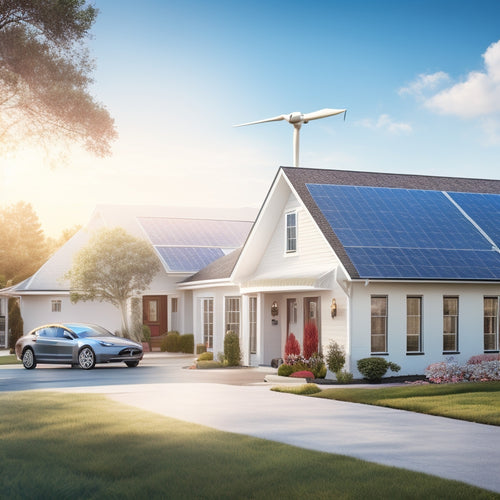
What Are the Best Cost-Effective Solar Panels
Share
You're likely looking for solar panels that balance quality and affordability, considering the significant upfront investment required for a typical residential installation, which can range from $15,000 to $30,000. Trina Solar, Jinko Solar, and Hanwha Q CELLS offer high-efficiency panels at affordable prices. When evaluating options, consider the trade-off between panel efficiency and installation costs. For small installations, Renogy, HQST, and Windynation offer compact and budget-friendly solutions. By understanding your energy needs, roof size, and budget, you can find efficient options that fit your constraints. Now, let's investigate how to maximize your return on investment with the right solar panel choice.
Key Takeaways
- Trina Solar, Jinko Solar, and Hanwha Q CELLS offer high-quality, budget-friendly solar panels with advanced technology.
- Balance panel efficiency with installation costs, considering factors like temperature coefficients and cost per wattage.
- Renogy, HQST, and Windynation provide affordable solar panels under $200, ideal for small installations and off-grid systems.
- Polycrystalline and thin-film panels are cost-effective for small homes, with installation costs ranging from $2.00 to $4.50 per watt.
- Long-term savings on energy costs, increased property value, and tax credits can maximize the return on investment for solar panels.
Understanding Cost-Effective Solar
In the pursuit of utilizing renewable energy, understanding cost-effective solar solutions is essential for homeowners and businesses alike.
You'll want to evaluate the various solar panel types, each with its own efficiency and price point. Monocrystalline silicon panels, for instance, offer high efficiency but come at a higher cost. Polycrystalline silicon panels, on the other hand, provide a more budget-friendly option with slightly lower efficiency. Thin-film panels are another option, offering the lowest upfront cost but also the lowest efficiency.
When evaluating cost-effective solar solutions, installation costs are a significant factor.
You'll need to assess the cost of the panels themselves, as well as the cost of installation, including labor, mounting hardware, and inverters. A typical residential solar panel installation can cost between $15,000 and $30,000, although prices vary depending on the size of the system and local incentives.
Top Brands for Budget-Friendly Options
You've narrowed down your options to the most cost-effective solar solutions, taking into account factors like panel type and installation costs.
Now, it's time to investigate top brands that offer budget-friendly options without compromising on quality. These brands have made notable advancements in solar innovations, making renewable energy more accessible to the masses.
Some of the top budget brands to evaluate are:
-
Trina Solar: Known for their high-efficiency panels at an affordable price point, Trina Solar is a popular choice for those on a budget.
-
Jinko Solar: With a wide range of panels catering to different energy requirements, Jinko Solar offers a cost-effective solution without sacrificing performance.
-
Hanwha Q CELLS: This brand offers high-quality panels with advanced technology at a competitive price, making it an attractive option for those looking for budget-friendly solar solutions.
These brands have successfully balanced quality and affordability, making solar energy a more viable option for individuals and businesses alike.
Efficiency Vs Cost: What Matters
You're likely wondering what matters more when selecting cost-effective solar panels: panel efficiency ratings or cost per wattage.
As you weigh your options, consider that high-efficiency panels may generate more power per hour of sunlight, but they often come at a higher upfront cost.
Panel Efficiency Ratings
Utilizing maximum energy from the sun relies heavily on the efficiency of your solar panels. As you evaluate your options, it's crucial to understand the panel efficiency ratings and how they impact your overall energy output.
When assessing panel efficiency, you'll come across terms like monocrystalline, polycrystalline, and thin-film. These refer to the type of photovoltaic cells used in the panels. Generally, monocrystalline panels have the highest efficiency ratings, followed by polycrystalline and then thin-film.
Here are some key factors to keep in mind when evaluating panel efficiency ratings:
-
Higher efficiency doesn't always mean better: While higher efficiency panels produce more power per hour of sunlight, they often come with higher installation costs.
-
Panel performance matters: Look for panels with high temperature coefficients, as they perform better in hot climates.
-
Balance efficiency with cost: Weigh the trade-off between panel efficiency and installation costs to find the sweet spot for your budget and energy needs.
Cost Per Wattage
How much are you willing to pay for each unit of power your solar panels produce? When evaluating cost-effectiveness, you need to take into account the cost per wattage, an essential factor in your wattage comparison. This metric helps you evaluate the price of each watt of energy produced by your solar panels.
A higher-efficiency panel may cost more upfront, but it can generate more power per unit area, reducing installation costs. For instance, a 300-watt panel with 20% efficiency might cost $250, while a 250-watt panel with 18% efficiency costs $200.
Although the former is more expensive, its higher efficiency translates to more power per unit area, making it a more cost-effective option in the long run.
When making a wattage comparison, focus on the cost per wattage rather than the overall cost of the panel. A lower cost per wattage indicates a more cost-effective option, even if the upfront cost is higher.
Best Solar Panels Under $200
Within the domain of solar energy, budget-friendliness is an essential aspect for many consumers, and finding the best solar panels under $200 can be an intimidating task.
You're not alone in this pursuit, as many homeowners are seeking affordable solutions to reduce their carbon footprint without breaking the bank.
When scouring through solar panel reviews, you'll find that budget installation is key to maximizing your return on investment.
To help you make an informed decision, here are some top contenders in the under-$200 category:
- Renogy 100W Monocrystalline Solar Panel: A compact and efficient option with a high conversion rate, perfect for small-scale installations.
- HQST 100W Polycrystalline Solar Panel: A budget-friendly option with a durable design, suitable for off-grid systems and small homes.
- Windynation 100W Polycrystalline Solar Panel: A reliable choice with a high-efficiency rate, ideal for RVs, boats, and small cabins.
These panels offer a great balance of performance and affordability, making them an excellent starting point for your solar energy expedition.
Affordable Options for Small Homes
As you investigate the domain of solar energy for small homes, you're likely looking for panels that not only fit your budget but also meet your specific needs. When it comes to affordable options, there are a few solar panel types that stand out.
| Solar Panel Type | Installation Cost |
|---|---|
| Polycrystalline | $2.50 - $3.50 per watt |
| Monocrystalline | $2.80 - $4.00 per watt |
| Thin-Film | $2.00 - $3.00 per watt |
| Bifacial | $2.80 - $4.50 per watt |
| PERC | $2.50 - $4.00 per watt |
For small homes, polycrystalline and thin-film solar panels are often the most cost-effective options. They offer a balance between efficiency and affordability. Monocrystalline and bifacial panels, on the other hand, are more efficient but come at a higher cost. PERC panels offer a middle ground, providing better efficiency than polycrystalline panels at a slightly higher price. When choosing a solar panel, consider your energy needs, roof size, and budget to select the best option for your small home.
Long-Term Savings and ROI
While exploring the domain of solar energy for your small home, you're likely curious about the long-term benefits that these cost-effective panels can bring.
One of the primary advantages of investing in solar panels is the significant savings they can generate over time.
With the right financing options and incentives programs, you can maximize your return on investment (ROI).
Here are some ways solar panels can help you save:
-
Reduced Energy Bills: By utilizing solar energy, you can reduce your reliance on the grid and lower your energy bills.
-
Increased Property Value: Installing solar panels can enhance your property value, making your home more attractive to potential buyers if you decide to sell.
-
Tax Credits and Rebates: You may be eligible for tax credits and rebates from the government and utility companies, which can help offset the initial cost of installation.
Frequently Asked Questions
Do Solar Panels Work During Power Outages?
You'll be happy to know that solar panels can work during power outages, but only if you have a battery backup system that stores excess energy, ensuring continuous power supply, unlike grid-tied systems that rely on solar panel efficiency alone.
Can I Install Solar Panels Myself to Save Money?
"Measure twice, cut once" is a wise adage to keep in mind when considering DIY solar installation. You can save money, but it's vital to follow precise guidelines and local regulations to guarantee a safe and efficient setup.
How Often Should I Clean My Solar Panels?
You'll want to clean your solar panels every 6-12 months, depending on the environment, to maintain ideal energy output; regular solar panel maintenance guarantees maximum energy harvesting, so set a schedule to inspect and clean your panels accordingly.
Are There Any Government Incentives for Solar Panels?
You'll be pleased to know that yes, there are government incentives for solar panels, including federal tax credits covering up to 26% of your installation costs, and state-specific rebates that can further reduce your expenses.
Can Solar Panels Be Recycled at the End of Their Life?
You might worry that solar panels will end up in landfills, but you'll be relieved to know that solar panel recycling is a growing industry, minimizing environmental impact by reclaiming precious materials like silicon, metal, and glass.
Related Posts
-

Why Go Green With Automotive Products Online?
By switching to eco-friendly automotive products online, you're taking a significant step towards reducing your carbo...
-

3 Best State and Local Solar Incentives USA
You can greatly reduce your energy dependence and save thousands of dollars by taking advantage of the top state and ...
-

Why Homeowners Are Embracing DIY Energy Independence
By taking control of your energy needs, you're breaking free from the uncertainty of utility bills and embracing a se...


